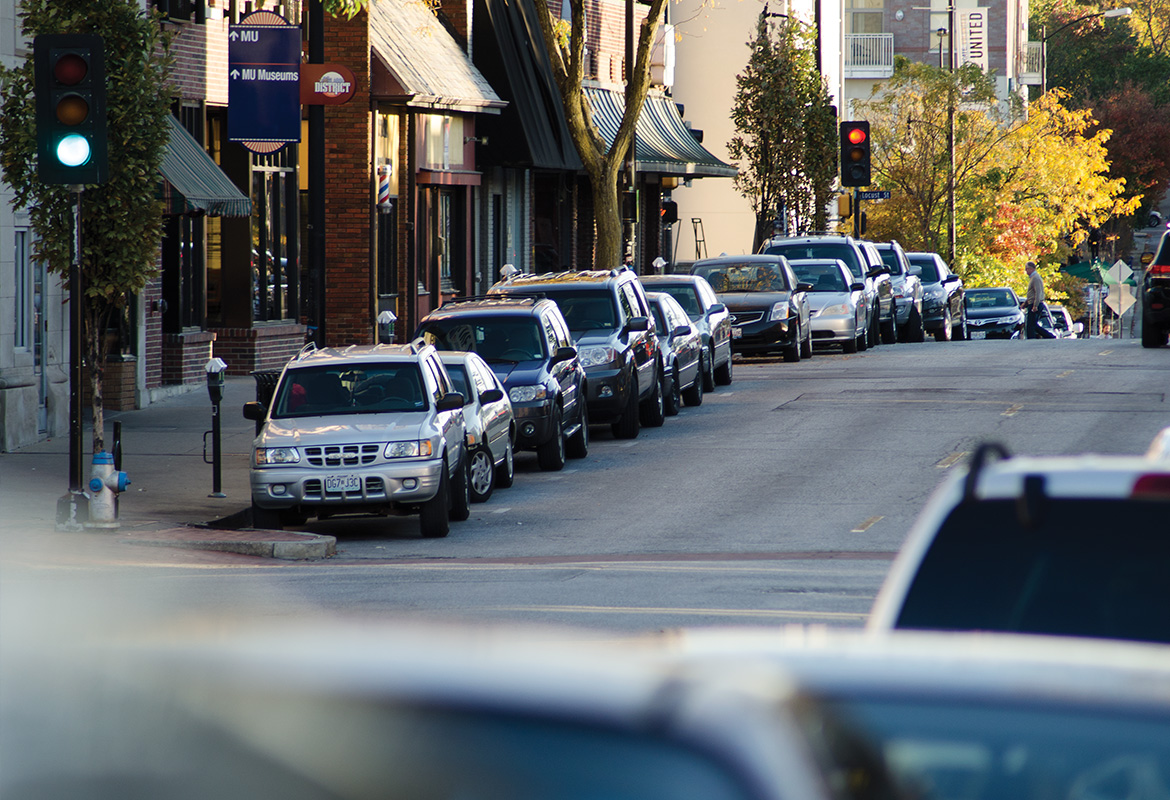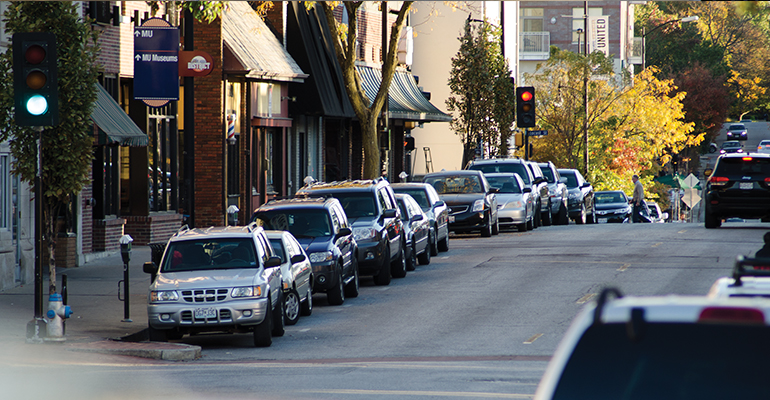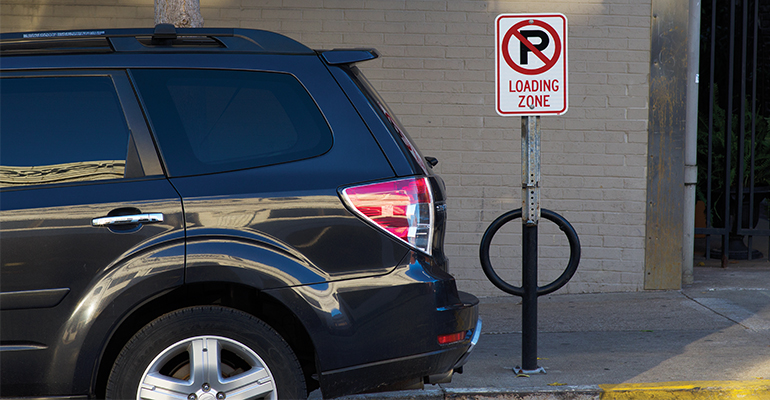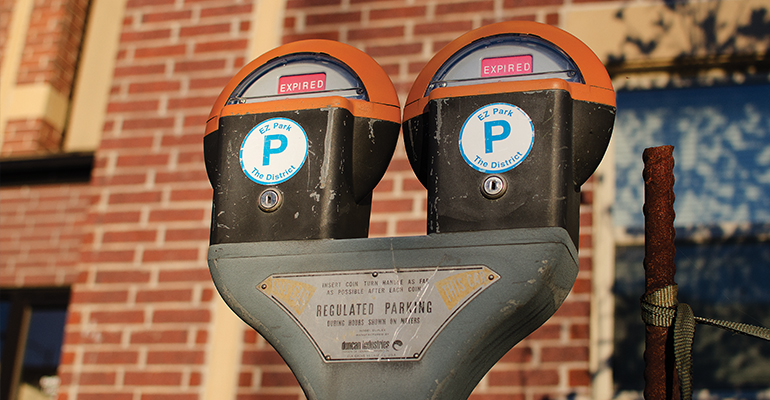Chasing Spaces

How should Columbia address the downtown parking problem?
Parking in downtown Columbia can often feel like trying to fit a square peg in a round hole.
“No matter what you do, people will complain about parking,” says Jim Charlier, president of Charlier Associates Inc., who led an EPA-sponsored parking audit and workshop for the city in August.
The need for good parking has been a topic of discussion as part of the Downtown Community Improvement District’s recent work on a hospitality zone assessment, says Katie Essing, director of the CID.
“It’s always a challenge for folks to find parking close to the place that they’d like to be,” Essing says. “One interesting finding from the city audit is that usually there is ample parking somewhere downtown. It just might not be in the location where someone is looking.”
The city’s audit and workshop centered on downtown and nearby neighborhoods. Charlier says he has held similar workshops in other cities, about half of which were college towns, such as Lawrence, Kansas, and he is acquainted with parking issues in Iowa City, Iowa and Boulder, Colorado. “The challenges that Columbia is talking about are very common in university communities,” Charlier says. “The names are different, but the issues are very similar.”
Among other things, the audit looked at turnover in parking spaces and utilization of spaces in parking garages, finding that weekly occupancy of on-street parking spaces peaked at 90 percent and that hourly parking in garages peaked at 75 percent. The audit also found that many cars parked in two-hour spots stayed in those spaces longer than three hours and that 10-hour parking spaces, meant for employees, were not being used.
Don Helmreich, part owner of Downtown Appliance Home Center on Broadway, says that adding an hour to meters probably wouldn’t hurt. “But the way I look at it,” he adds, “if they’re taking four hours when they’re only supposed to be taking two, then if you give them three, they’re probably going to take six.”
Meanwhile, a new program launched by the city and the District allows employees to purchase an inexpensive meter pass, which may help encourage employees to use those 10-hour meters located on the fringes of the downtown district, Essing says. The pilot program began in August and costs $35.
“Usually you can just park four or five blocks away at a 10-hour meter and easily walk to where you work,” Essing says. “They’re not very far away — between a five and nine-minute walk.”
The Parking Games
People Play
But not everyone would agree to a nine-minute walk. “We’re a typical Midwestern city,” says Steven Sapp, public information specialist for the city’s public works department. “We like our cars, and we want to park right in front. We don’t want to walk a block or two.”
Rachel Bacon, a planner for the city, thinks parking patterns are set by past habit. “People will choose on-street parking even if a garage is cheaper and closer,” she says.
From one perspective, parking challenges are good to have, as they tend to stem from a strong local economy. “Your downtown is really thriving, and in part, it’s thriving because so much of the university residential has gone into the downtown,” Charlier says. “Show me a place where parking is a problem, and I’ll show you a place that’s economically vibrant. Parking demand grows with economic activity.”
Charlier acknowledges that the new student residential buildings downtown may have brought Columbia parking challenges that will need to be managed. “But you’re better off with that strategy than you would have been if you had gone with a strategy that was providing one parking space per bed, or something like that,” he says. “We are entering an era when parking demand is going to begin to drop.”
Charlier says there is a general demographic shift away from owning automobiles, except for baby boomers, who own more cars per capita than previous generations.
“It’s good that you’re not overinvested,” he says. “That’s a much better situation to have than to have acres and acres of underutilized parking or to have a bunch of white elephant parking garages that you don’t need.”
Counting Cars
The city administers about 4,500 parking spaces in six parking garages and 10 surface lots. According to Sapp, the city does not separate out revenue from each garage, but it rather looks at the health of the overall parking utility and whether it brings in enough revenue to cover costs. The city would only look at an individual garage if its occupancy were dropping.
While the recent city audit counted actual cars in spaces — a number that varies widely by day or even time of day — the city counts the number of parking permits issued, Sapp says. The city often issues more permits than there are spaces available because not everyone who has purchased a permit is always parked in that garage. The average ratio of spaces issued on Oct. 26 was 102 percent, and the ratio was about 10 percent lower during the summer, when most students are away. While the ratio at Short Street Garage, for example, is 98 percent, some garage ratios are consistently above 100 percent.
The three main types of permits sold are reserved spaces, which cost $115 per month and are assigned particular spots; permit spaces, which cost $65 to $75 and allow a car to park within a particular garage or lot; and hourly spaces, which are usually metered and are 50 to 75 cents per hour.
The Parking Conundrum:
Are Students to Blame?
Where and why people park the way they do is a function of multiple factors, Bacon says, including availability, price and enforcement. “There’s no one reason there’s a parking problem,” Bacon says. “It will require a combination of solutions.”
One potential cause for parking consternation downtown comes from recent student housing construction. Parking in a university garage averages $18 to $21 per month for daytime hours, but only two university commuter lots, near the Hearnes Center and veterinary school, allow overnight parking for students living off campus, according to the university’s parking and transportation office. Either option means a long walk for students who live downtown, where parking is more expensive.
In the city’s Short Street parking garage, near a Brookside student housing development, parking costs $75 per month, or $900 per year. There are only enough spots in that garage for about 60 percent of renters in the nearby Brookside complex at Walnut Street and College Avenue, according to Brookside’s inquiries department. Brookside also owns some surface lots downtown, which cost $50 to $65 a month, but they may not be convenient to residents.
Tanner Morrell, the city’s parking supervisor, wrote in an email that students are no more of aproblem in terms of parking than other residents. “When such high-rise student housings don’t provide parking sufficient for their tenants … those tenants seek out parking in city garages, lots and streets,” he wrote. “Sometimes it creates problems we have to work through, other times we find that there is enough parking to satisfy the needs of all.”
Some students have resorted to illegally parking their cars because nearby parking is too expensive, inconvenient or unavailable. One student, who requested that his name not be used, says he has relied on parking passes dropped by guests of the nearby Broadway Hotel since the beginning of the fall semester. He says he usually only needs a hotel pass on the weekends because the garage is not monitored on weekdays, when a lot of students park there.
“On the weekends, it’s miserable. Of course, it’s worst on Mizzou home game days,” he says.
The overwhelming majority of citations issued by the city are for expired meters — more than 45,000 out of 60,000, Morrell wrote.
Essing suggested that a system of higher fines for subsequent parking tickets could help. This idea has other supporters as well, including Second Ward Councilman Michael Trapp, who attended the parking workshop. The graduated fine system was also suggested in the audit report delivered to council.
Squeezing Customers?
Businesses see the parking problem through a different lens. Each nearby space taken by an employee, held by someone longer than two hours or taken by a delivery driver for another business may mean a lost customer to a store like Downtown Appliance, Helmreich says.
Helmreich says the loss of spaces from construction of the Short Street garage has hurt his business. “All you’ve got to do is open your eyes to see we have a parking problem,” he says. “They didn’t need a survey to tell them that.”
Several years ago, the city wanted to change the parking on Broadway from Hitt Street to College, in front of Downtown Appliance, from angled spaces to parallel spaces. “I went to a meeting and said, ‘You’re going to kill my business,’” Helmreich says. “And they said, ‘What do you mean? We built a parking garage on Hitt Street.’ And I said, ‘You really think that someone who wants to buy a washer is going to park in that garage and walk two blocks or whatever to my store?’”
Helmreich says the parallel parking proposal would have subtracted 17 nearby parking spaces, but the lane configuration for the new parking garage at Short Street took out many more spaces.
Festivals, Helmreich says, may be another culprit of parking woes. “I’m all in favor of Roots and Blues and the film festival, but those two things kill my business,” Helmreich says. “They take up all the parking, and customers can’t get to my store if they want to park anywhere close. They are great for Columbia and great for the restaurants and bars and maybe gift shops, but none of those people are going to come in and buy appliances.”
Although downtown housing contributes to downtown’s parking shortage, Helmreich says people who live downtown support his business. He also owns apartments above his store, so he sympathizes with downtown residents who need a place to park their cars.
Back to the Future: Potential Answers
So what can the city do about downtown parking woes? For starters, it might help businesses if the city would let them have two dedicated spaces reserved outside their business, Helmreich says. Sapp says such a practice might be possible if the parking ordinance were changed. Presently, only financial institutions are allowed to purchase parking spaces outside their business.
“I really don’t know what they can do without building more parking garages, as long as they make sure the garages are lit, have cameras and are safe,” Helmreich says.
Technology also may provide part of the answer. The city recently began using Parkmobile, a cell phone app to track parking downtown. “It’s interesting to see the different technologies that are available that could help track available locations and help people easily find spaces,” Essing says.
The Parkmobile app also allows users to pay for parking with their phones. The city made the Parkmobile app available on some meters along Ninth Street and Broadway in August, and there were 310 Parkmobile transactions in September, Sapp says.
Similar to the task force, another potential answer to parking problems might be the formation of a new citizens’ parking commission, which was favored by stakeholders at the workshop. While a city task force usually has a set of specific goals, a permanent parking commission might have the ability to look at the city holistically, and thereby bring some consistency to neighborhoods with varying needs, Sapp says.
Charlier says a parking commission would be a good answer for Columbia, but he told workshop attendees that the commission should focus on downtown and nearby areas first. Once the commission gets experience, it could then widen its focus to the rest of the city.
Helmreich says the long-term solution involves increased capacity. “We just need more parking,” Helmreich says. “Of course, to get more parking garages, you’re going to have to tear down some buildings somewhere. But they can’t have mine!”





